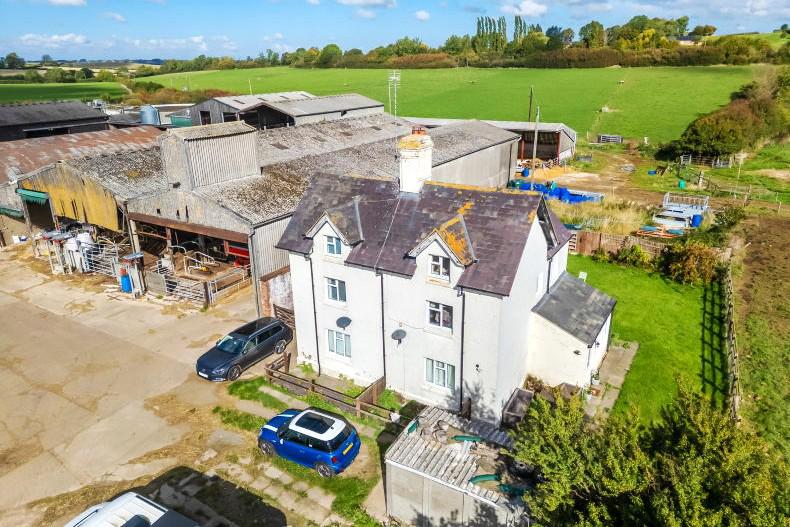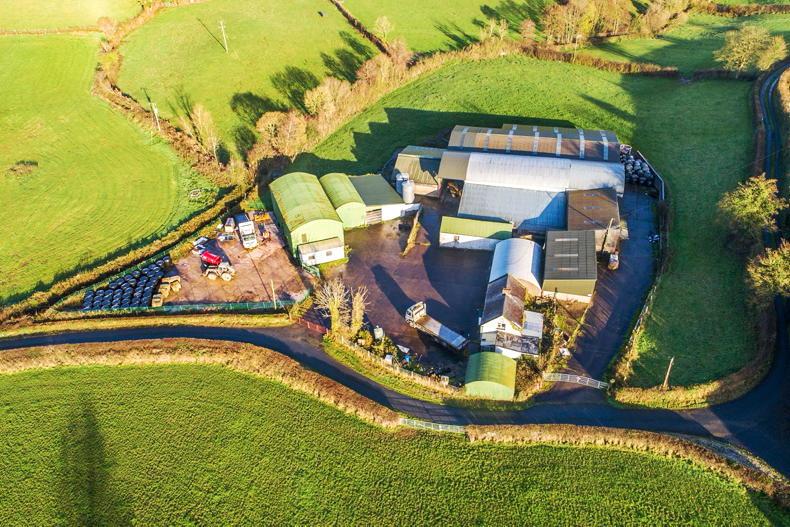Picture the scene: as you walk into the cinema in Roscommon town to take your seat to see one of the most talked about Irish films in years, just ahead of you is one of the film’s stars.
Many are shocked to see Philip Dolan, who plays Jamesie in the IFTA-winning adaptation of John McGahern’s beloved novel That They May Face The Rising Sun in the large audience.
What’s even more surprising is that Philip, who lives a short drive away in Knockcroghery village, has zero acting experience and was discovered purely by chance in his village pub. It was telling a childhood story at a South Roscommon Singers session in 2022, that the film’s director, Pat Collins, decided he was his Jamesie.
Philip has been pinching himself ever since and is revelling in what he calls “the best time of my life”. From filming in Connemara to attending premieres in London and Dublin as well as dressing up for glittering occasions like the IFTAs, where it won the Best Irish Film award, he has become part of a whole world that he never even dreamed of.
This beautiful adaptation of the much-loved John McGahern novel has been captivating reviewers and audiences. Building momentum every week since its cinema release in late April, it is still being run in over 60 cinemas across Ireland and the UK. The appeal is partly nostalgic: it’s a quietly affecting portrait of rural Ireland of the late 1970s and 80s, where nothing happens but everything happens to a couple, Joe and Kate (who have returned from London), and their friends, over four seasons in a lakeside farming community.

Philip Dolan pictured in the middle at the London premiere of That They May Face the Rising Sun, from left to right is Barry Ward, Lalor Roddy, Anna Bederke and Brendan Conroy.
McGahern fan
Irish Country Living recently caught up with Philip in his restored former railway station house, where he lives with his wife Marina, who he jokes is his “agent”. A huge fan of the revered Leitrim writer, Philip says the main reason the film has resonated with so many people, particularly in rural areas, is that McGahern was a farmer and a writer who depicts the “complex simplicity” of daily life.
“The beauty is he didn’t re-invent anything about rural Ireland. He just took what was everyday; the characters were all around him,” says Philip.
“He took ordinary things and made them into things of beauty or sadness, like the cow calving or the lamb being trampled.”
Philip’s character Jamesie is helpful, kind and quick-witted, and loves a bit of news. He appears in the opening frame of the film with that distinctive ‘hello, hello, hello’ greeting of one neighbour calling to another.

Philip and Marina Dolan pictured at their renovated train station home in Knockcroghery in Co Roscommon. \ Brian Farrell
While this may be his first foray into the world of feature films, it doesn’t show on screen. He is a natural, and has been gaining very positive reviews – and more than holds his own with Irish acting greats like Sean McGinley, Ruth McCabe and Barry Ward.
Far from being overawed, he embraced the experience despite how unfamiliar it was. “I didn’t even bother to act. I based Jamesie on old characters I grew up with in Glangevlin, west Cavan, not too far from where the book is set.”
He laughs that he never looked at the camera, and he didn’t know where it was. “If the camera wants me, it’ll find me.”
Farming background
Perhaps another reason for his lack of nerves is that Philip knows the territory well. Farming has always been part of his life in one way or another, despite the fact that he worked in the oil industry for decades in France, Africa and the Middle East.
One of seven, Philip grew up on a small Cavan farm where the land was so thin it couldn’t be ploughed, so his father, who started out with just 16 acres, had to turn it by hand.
The nostalgic haymaking scenes in the film were still a world away from his childhood job of twisting the hay into a rope. “It was almost like weaving wool,” recalls Philip. “You’d twist the rope (from the hay) and it was used for tying down the cocks of hay,” he remembers fondly.
“The area was pickled with older people. They all had their own way of telling a story, their own way of doing things, and I suppose I would have copied them and listened to them,” says Philip. He got a great grounding from them before leaving for boarding school at age 13, in Cavan town.
After the Leaving Cert, he spent a few years in a seminary before leaving, and returning to agriculture, buying a farm with his brother in Ballinamore.
Philip quips that they were going to be ranchers – that was until the bottom fell out of the cattle market in 1974. Animals were making only £20; and that’s if you could sell them.
He later went to London, where he did an engineering course and, through that, got his first contract in the Middle East with an oil company inspecting pipelines. He stayed with that for 40 years. Travelling over and back, his great support, wife Marina, took care of their three now-adult children, Petra, Shauna and Killian. The couple returned to farming in Roscommon in later years, and this land is now rented.

A haymaking scene from the film.
Like a lot of people, the film took him back in time.
“I was very nostalgic when the film was being made; I broke down crying a few times because it was so real,” says Philip. “It was almost like you were reliving something that you knew was gone. Yet, there was something nice about it. There was a wonderful calmness about (the set),” he says as the train thuds past the back door, making the building shudder slightly.
Earlier, Philip pointed out the old ticket office feature that they retained in the front of the home. It was once Knockcroghery railway station, until it closed in 1963, prior to restoration in the late 1970s.
He is full of praise for director Pat Collins, whom he previously described as being like an old-time cattle dealer at a fair, waiting for the right time to make his move, nod, or wink on set.
“From a personal point of view, he (Pat) put his neck on the line picking someone like me, and I’m delighted I didn’t let him down,” Philip says, smiling.

Philip Dolan in a scene from the film That They May Face the Rising Sun.
Cinema experience
A great storyteller and conversationalist, Philip admits he has seen the film seven times. “It’s grown on me,” he says, laughing heartily. Recently, he went to Carrick-on-Shannon to see it with his old teacher. Many people there had known John McGahern.
“One man said to me, ‘You know I was John’s vet’ and we had a lovely chat. Everyone was shaking my hand,” he says.
“It’s an absolutely lovely piece of work. When you talk to other people, they say they just sat for five minutes afterwards in the cinema, to take it all in.”
While modest about his part in the film’s success, there is also a lovely sense of pride in this unexpected turn in his life. Philip is genuinely delighted to have met such nice people and made so many friends throughout the experience.
“There was never anyone saying you’re not an actor – and there could have been because work is scarce,” says Philip.
Asked what message he’d like people to take from the film, he suggests that listening to nature and talking to people more are his big takeaways.
“I said to someone in London that what I’d like is that this (film) would hold a mirror up and say to us – you don’t always have to rush around, slow down, and maybe have more time for each other and talk more rather than being on the phone.”
• That They May Face The Rising Sun was John McGahern’s final novel. He wrote six in total
• The story revolves around Joe (Barry Ward) and Kate Ruttledge (Anna Bederke) who returned from London to live and work among a small lakeside community near where Joe grew up
• The much-loved Leitrim writer is regarded as as one of the best Irish novelists of the 20th century
• McGahern, who lived near Fenagh village, died in 2006, aged 71
• The book and film title refers to tradition that graves face the rising sun to the east
• The film adaptation was shot in Clonbur, Corr na Móna and Loch Na Fooey in Co Galway
• Director/writer Pat Collins also made an acclaimed documentary on the novelist called John McGahern: A Private World in 2005
• That They May Face The Rising Sun won Best Irish Film at the Dublin International Film Festival and Best Film the IFTAS. It is showing in cinemas nationwide.
Picture the scene: as you walk into the cinema in Roscommon town to take your seat to see one of the most talked about Irish films in years, just ahead of you is one of the film’s stars.
Many are shocked to see Philip Dolan, who plays Jamesie in the IFTA-winning adaptation of John McGahern’s beloved novel That They May Face The Rising Sun in the large audience.
What’s even more surprising is that Philip, who lives a short drive away in Knockcroghery village, has zero acting experience and was discovered purely by chance in his village pub. It was telling a childhood story at a South Roscommon Singers session in 2022, that the film’s director, Pat Collins, decided he was his Jamesie.
Philip has been pinching himself ever since and is revelling in what he calls “the best time of my life”. From filming in Connemara to attending premieres in London and Dublin as well as dressing up for glittering occasions like the IFTAs, where it won the Best Irish Film award, he has become part of a whole world that he never even dreamed of.
This beautiful adaptation of the much-loved John McGahern novel has been captivating reviewers and audiences. Building momentum every week since its cinema release in late April, it is still being run in over 60 cinemas across Ireland and the UK. The appeal is partly nostalgic: it’s a quietly affecting portrait of rural Ireland of the late 1970s and 80s, where nothing happens but everything happens to a couple, Joe and Kate (who have returned from London), and their friends, over four seasons in a lakeside farming community.

Philip Dolan pictured in the middle at the London premiere of That They May Face the Rising Sun, from left to right is Barry Ward, Lalor Roddy, Anna Bederke and Brendan Conroy.
McGahern fan
Irish Country Living recently caught up with Philip in his restored former railway station house, where he lives with his wife Marina, who he jokes is his “agent”. A huge fan of the revered Leitrim writer, Philip says the main reason the film has resonated with so many people, particularly in rural areas, is that McGahern was a farmer and a writer who depicts the “complex simplicity” of daily life.
“The beauty is he didn’t re-invent anything about rural Ireland. He just took what was everyday; the characters were all around him,” says Philip.
“He took ordinary things and made them into things of beauty or sadness, like the cow calving or the lamb being trampled.”
Philip’s character Jamesie is helpful, kind and quick-witted, and loves a bit of news. He appears in the opening frame of the film with that distinctive ‘hello, hello, hello’ greeting of one neighbour calling to another.

Philip and Marina Dolan pictured at their renovated train station home in Knockcroghery in Co Roscommon. \ Brian Farrell
While this may be his first foray into the world of feature films, it doesn’t show on screen. He is a natural, and has been gaining very positive reviews – and more than holds his own with Irish acting greats like Sean McGinley, Ruth McCabe and Barry Ward.
Far from being overawed, he embraced the experience despite how unfamiliar it was. “I didn’t even bother to act. I based Jamesie on old characters I grew up with in Glangevlin, west Cavan, not too far from where the book is set.”
He laughs that he never looked at the camera, and he didn’t know where it was. “If the camera wants me, it’ll find me.”
Farming background
Perhaps another reason for his lack of nerves is that Philip knows the territory well. Farming has always been part of his life in one way or another, despite the fact that he worked in the oil industry for decades in France, Africa and the Middle East.
One of seven, Philip grew up on a small Cavan farm where the land was so thin it couldn’t be ploughed, so his father, who started out with just 16 acres, had to turn it by hand.
The nostalgic haymaking scenes in the film were still a world away from his childhood job of twisting the hay into a rope. “It was almost like weaving wool,” recalls Philip. “You’d twist the rope (from the hay) and it was used for tying down the cocks of hay,” he remembers fondly.
“The area was pickled with older people. They all had their own way of telling a story, their own way of doing things, and I suppose I would have copied them and listened to them,” says Philip. He got a great grounding from them before leaving for boarding school at age 13, in Cavan town.
After the Leaving Cert, he spent a few years in a seminary before leaving, and returning to agriculture, buying a farm with his brother in Ballinamore.
Philip quips that they were going to be ranchers – that was until the bottom fell out of the cattle market in 1974. Animals were making only £20; and that’s if you could sell them.
He later went to London, where he did an engineering course and, through that, got his first contract in the Middle East with an oil company inspecting pipelines. He stayed with that for 40 years. Travelling over and back, his great support, wife Marina, took care of their three now-adult children, Petra, Shauna and Killian. The couple returned to farming in Roscommon in later years, and this land is now rented.

A haymaking scene from the film.
Like a lot of people, the film took him back in time.
“I was very nostalgic when the film was being made; I broke down crying a few times because it was so real,” says Philip. “It was almost like you were reliving something that you knew was gone. Yet, there was something nice about it. There was a wonderful calmness about (the set),” he says as the train thuds past the back door, making the building shudder slightly.
Earlier, Philip pointed out the old ticket office feature that they retained in the front of the home. It was once Knockcroghery railway station, until it closed in 1963, prior to restoration in the late 1970s.
He is full of praise for director Pat Collins, whom he previously described as being like an old-time cattle dealer at a fair, waiting for the right time to make his move, nod, or wink on set.
“From a personal point of view, he (Pat) put his neck on the line picking someone like me, and I’m delighted I didn’t let him down,” Philip says, smiling.

Philip Dolan in a scene from the film That They May Face the Rising Sun.
Cinema experience
A great storyteller and conversationalist, Philip admits he has seen the film seven times. “It’s grown on me,” he says, laughing heartily. Recently, he went to Carrick-on-Shannon to see it with his old teacher. Many people there had known John McGahern.
“One man said to me, ‘You know I was John’s vet’ and we had a lovely chat. Everyone was shaking my hand,” he says.
“It’s an absolutely lovely piece of work. When you talk to other people, they say they just sat for five minutes afterwards in the cinema, to take it all in.”
While modest about his part in the film’s success, there is also a lovely sense of pride in this unexpected turn in his life. Philip is genuinely delighted to have met such nice people and made so many friends throughout the experience.
“There was never anyone saying you’re not an actor – and there could have been because work is scarce,” says Philip.
Asked what message he’d like people to take from the film, he suggests that listening to nature and talking to people more are his big takeaways.
“I said to someone in London that what I’d like is that this (film) would hold a mirror up and say to us – you don’t always have to rush around, slow down, and maybe have more time for each other and talk more rather than being on the phone.”
• That They May Face The Rising Sun was John McGahern’s final novel. He wrote six in total
• The story revolves around Joe (Barry Ward) and Kate Ruttledge (Anna Bederke) who returned from London to live and work among a small lakeside community near where Joe grew up
• The much-loved Leitrim writer is regarded as as one of the best Irish novelists of the 20th century
• McGahern, who lived near Fenagh village, died in 2006, aged 71
• The book and film title refers to tradition that graves face the rising sun to the east
• The film adaptation was shot in Clonbur, Corr na Móna and Loch Na Fooey in Co Galway
• Director/writer Pat Collins also made an acclaimed documentary on the novelist called John McGahern: A Private World in 2005
• That They May Face The Rising Sun won Best Irish Film at the Dublin International Film Festival and Best Film the IFTAS. It is showing in cinemas nationwide.












SHARING OPTIONS